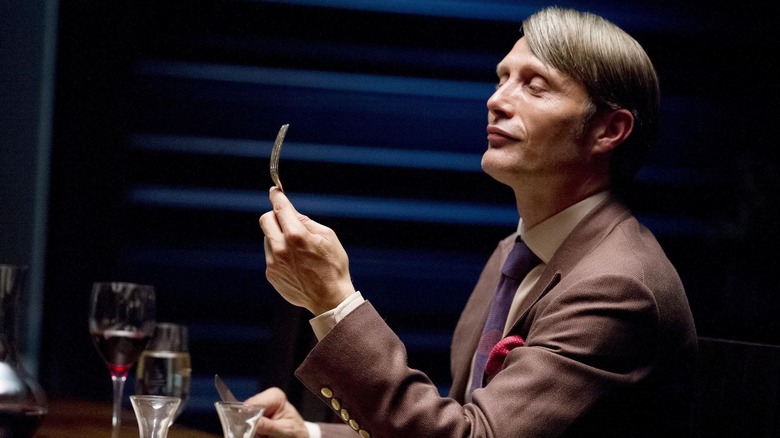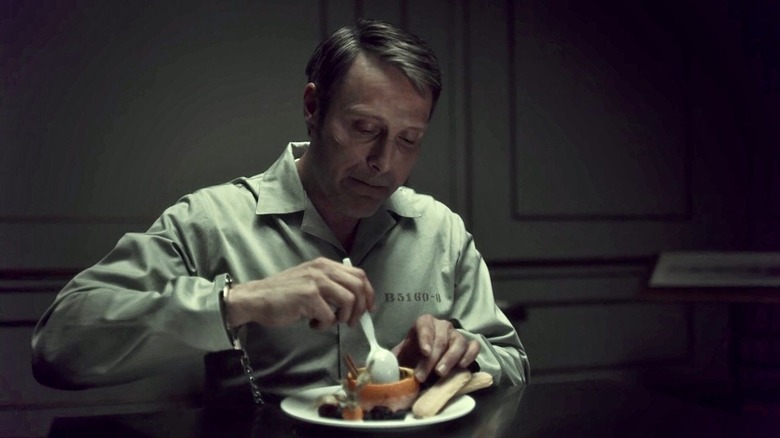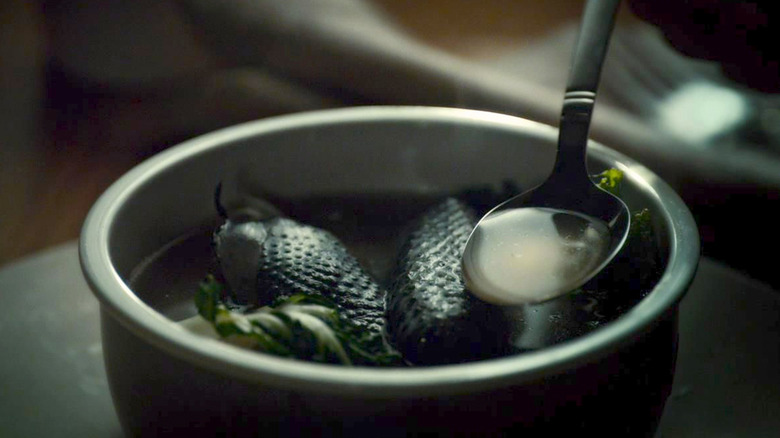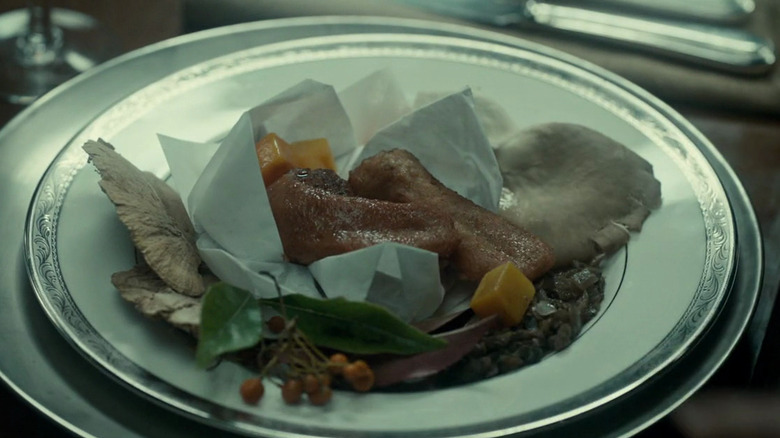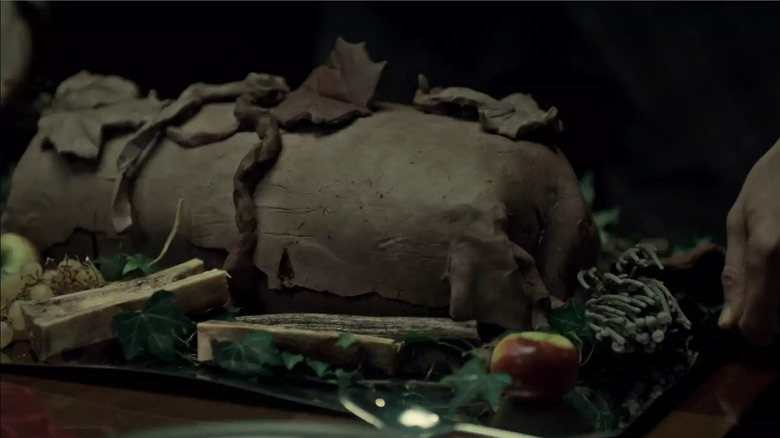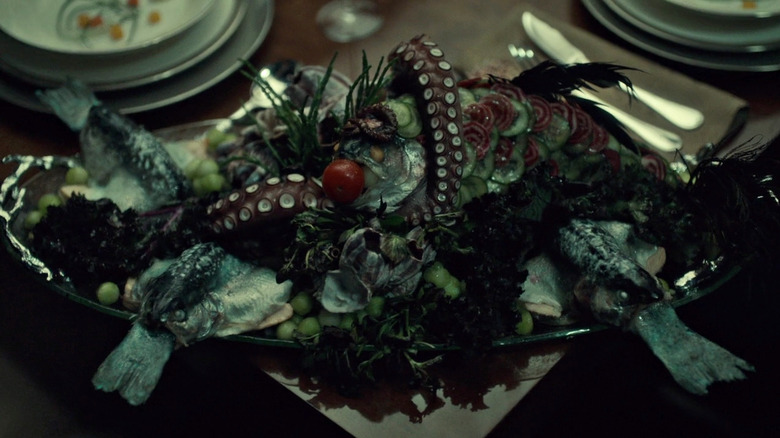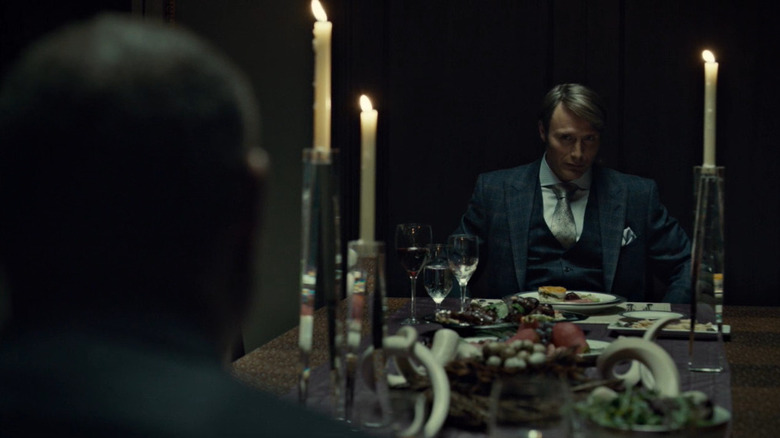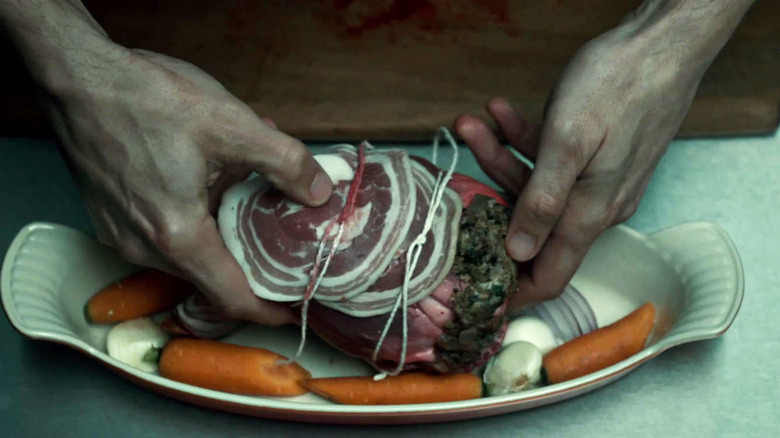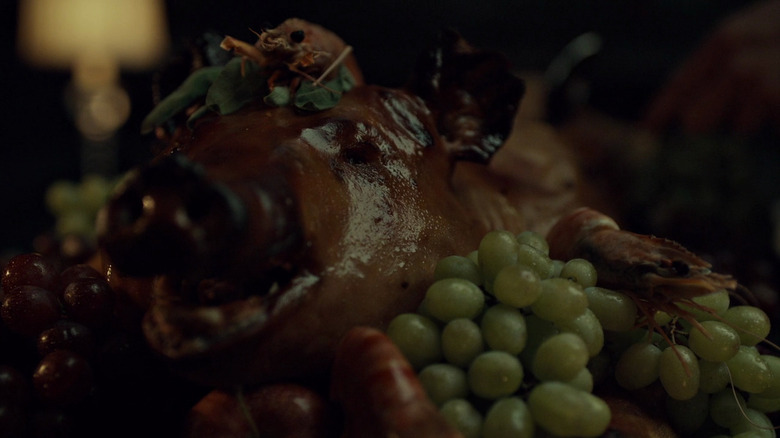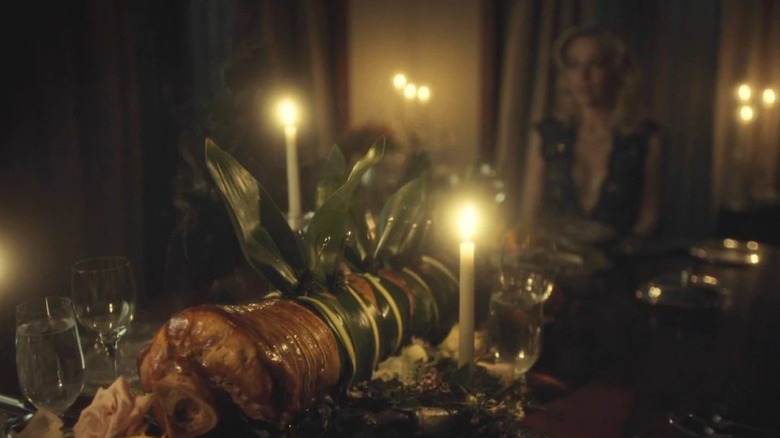The Most Surprisingly Appetizing Moments In Hannibal
Though its last episode aired in 2015, Bryan Fuller's opulent, gothic horror take on the police procedural genre and the iconic characters created by Thomas Harris is still considered essential viewing by many. Watching it, it's easy to see why. Mads Mikkelsen and Hugh Dancy breathe glorious, messy life into the characters of Hannibal Lecter and Will Graham, and the dizzying, dangerous dance that the two engage in over the show's three seasons is nearly impossible to look away from.
Like Lecter himself, the show's aesthetic and storytelling blend stylish decadence with stomach-churning horror. The dialogue abandons realism and standard cop show mainstays in favor of the poetic, serving up lines like, "Killing must feel good to god, too. He does it all the time. And are we not created in his image?" If watching an excellent episode of television is the artistic equivalent of a good meal, then "Hannibal" is a gourmet banquet. There's a lot to love, but there is one detail that is given such loving attention, such care and craftsmanship, that the show would not be the same without it: the food. Food is a vital part of storytelling is a vital part of storytelling and often one of the most memorable aspects of a film or television show. How many of us have salivated at the sight of a steaming hot dish in a Miyazaki film or yearned to take a bite out of the breakfast sandwich from "Birds of Prey?" Janice Poon, the food stylist responsible for crafting each of Dr. Lecter's culinary delights, many of which may or may not contain human flesh, marries the gruesome and the opulent with each creation.
The result is a series of indulgent, inventive dishes that reflect the drama bubbling under the surface of each character and the inner state of Hannibal himself and look good enough to eat — as horrifying as that might be to imagine. We're taking a look at some of the most surprisingly appetizing moments in "Hannibal," so grab your napkin and make sure you remember your table manners. After all, those who are rude at Dr. Lecter's table often end up as the next main course.
Sanguinaccio dolce (Season 3, Episode 8)
Even in prison, Hannibal Lecter is the consummate host. In this Season 3 episode, he invites his old enemy, Dr. Chilton (who he once tried to implicate in a series of murders and frame as a serial killer) to share a meal in his cell. There, he proves that even the desserts he prepares have a carnivorous edge that reflects his taste for blood — metaphorically and literally.
It's an Italian pudding made from a mixture of blood and chocolate, sweetness and brutality served in a hollowed-out orange with a stick of cinnamon. The dish is traditionally made using pig's blood, but we all know that Hannibal loves to put his own spin on old recipes. Like any savvy dinner guest of Dr. Lecter's, Chilton is sure to ask where the blood came from. He does not need to worry, though, it came from a local cow. Under the supervision of the authorities, Hannibal has to behave himself — at least a little bit. The last time he served it, however, "The blood was from a cow only in the derogatory sense."
Black chicken soup (Season 1, Episode 12)
Fans and cast members alike have frequently noted the romantic subtext between the characters of Hannibal Lecter and Will Graham. Mads Mikkelsen admitted that he wanted to kiss Hugh Dancy during a particular scene in the Season 3 finale. Though the relationship between the two men reaches the apex of its conflict and intensity in Season 3, they exchange gestures that border on romantic all the way back in Season 1. Of course, these gestures often come with ulterior motives. In "Releves," the twelfth episode of Season 1, Hannibal brings chicken soup to Will as he recovers in the hospital, intending to learn more about his mental and physical state while they dine together.
This is no ordinary pedestrian chicken soup from a can, mind you. Dr. Lecter would never prepare something he considered so unrefined. Instead, he prepares something elaborate with a touch of darkness — literally. It's a soup made from the Silkie chicken, a Chinese variety known for its black flesh and bones. He combines this with wolfberries, ginger, and red dates for a warm, nurturing dish that looks a bit out of place in a humble Tupperware container. Campbell's, eat your heart out.
Langue d'agneau en papillottes (Season 1, Episode 6)
Tongue can be a bit of controversial meat. Some swear by it, others won't touch it with a ten-foot pole. Those who do appreciate it might find themselves tempted by the tongue served to Alana Bloom (Caroline Dhavernas) and Dr. Chilton (Raúl Esparza) in this Season 1 episode. As he presents the dishes to his guests, Hannibal offers one of his patented double-entendres: "Nice to have an old friend for dinner."
Served with oyster mushrooms in a recipe inspired by the French chef Auguste Escoffier, it's a slightly divisive dish that is nevertheless certain to be delicious to anyone who can get past the idea of eating something's tongue. Hannibal introduces it as lamb tongue, but according to Janice Poon, the tongue is human in origin. More specifically, they're children's tongues, a horrifying fact that makes you go from "That looks pretty good" to "Oh, God! What's wrong with me?"
Clay-roasted thigh (Season 2, Episode 6)
Frequently on "Hannibal," there is a degree of uncertainty around any meat-based dish that Dr. Lecter serves. He might say it's pork, lamb, or beef, but is it really? In the case of this particular main course, there is no question about it. How can there be, when he's serving the meat right to the person it came from?
Hannibal prepares this particularly theatrical dish, thigh encased in clay covered in delicate, sculpted leaves and served over a bed of ivy, apples, and bones from the leg of Abel Gideon (Eddie Izzard). As he presents the food to his "guest," he offers to carve. Dryly, Abel remarks, "I think you already have." The meal itself is gorgeously prepared and invites the viewer to imagine taking a bite. Still, the dinner is nothing short of chilling. It is intended to serve as Abel's last meal as he dines on himself, staring into the face of the man who took his leg and is preparing to take his life.
Truite saumonée au bleu (Season 2, Episode 8)
Hannibal Lecter is nothing if not versatile, and this Lovecraftian-looking meal shows off his mastery of different proteins, shining the spotlight on seafood rather than game or livestock. Don't be distracted by the tentacles. The focus of the dish is the trout with the tail jutting from its mouth. It features trout, caught wild by Will on a fishing trip. Hannibal waxes poetic about the fish, saying, "More flavorful and firm than farmed specimens, I find the trout to be a very Nietzschean fish. Trials of his wild existence find their way into the flavor of the flesh."
The Kraken-like horrors of the dish's presentation aside, it comes at an unusually peaceful moment for Hannibal. He's removed himself from Will's suspicion, for the time being. He's exploring a relationship with Alana, and everything seems to be on the upswing for the good doctor. Despite how much his circumstances have calmed, the meal has a macabre look from the octopus tentacles to the ouroboros-like image of the fish swallowing their tails. With Hannibal's talent for crafting exquisite flavors, you know it would taste excellent with the bonus of being very clearly not human meat.
Boudin noir (Season 1, Episode 4)
It's not often that we get a direct look at the source of Hannibal's, shall we say, specialty ingredients. However, in this early Season 1 episode, we get a peek at the source of the "rabbit" meat that is being served to Agent Jack Crawford Laurence Fishburne). Hannibal introduces the meal, boudin noir (or French blood sausage), and Jack quips, "He should have hopped faster." Hannibal chuckles knowingly, and the audience is treated to a flashback of a man running through the woods, presumably from Hannibal. Should have hopped faster, indeed.
The face of Dr. Lecter's terrified victim intercut with the elegant meal he was fated to become is a nice bit of nauseating gallows humor. The blood sausage served alongside a potato, leek, and cheddar pavéIt looks delicious, too. It's enough to make your stomach rumble before you feel a sudden pang of guilt at the reminder that this is not, in fact, rabbit blood sausage.
Mushroom and spinach-stuffed heart (Season 1, Episode 7)
This episode features not just one but several lavish dishes, as Hannibal throws a dinner party for eight in which "nothing is vegetarian" (that's an understatement). While Will is driving himself wild investigating the Chesapeake Ripper, obsessing over who is guilty, who is innocent, and what will happen next, Dr. Lecter is treating his guests to an incredible array of meat-based dishes. There is blood sausage, carpaccio, liver, head cheese, and pretty much any carnivorous delight one can think of.
But the star of the show is the main course, the stuffed skewered heart, filled with mushrooms, herbs, and butter and wrapped in slices of pancetta. The heart is served with red roses — tomato roses, that is — and heart tartare in vol-au-vents. Hannibal pours his heart into his cooking, and here that becomes quite literal. He serves his guests a piece of his heart, and some of his favorite dishes, though he'll never tell them what's really inside. If you're not a vegetarian, it's easy to get swept up in the sheer spectacle of it all and think about grabbing a plate for yourself.
Sashimi (Season 2, Episode 1)
Dr. Lecter seems to serve seafood when he is feeling the most like he is winning — when he is on top of the world and at peace. After Will's arrest, Dr. Lecter kicks off Season 2 by serving an elegant sashimi meal to Jack Crawford. It's gloriously presented in the style of the episode's title, "Kaiseki," a Japanese art form that honors both the taste and the beauty of the food being served. Jack remarks on the stunning presentation, saying "I almost feel guilty about eating it." Hannibal responds with a quip: "I never feel guilty eating anything." Wonderful words to live by, unless you're a cannibal.
No one needs to feel guilty about eating this particular meal, however. It's a mix of seasonal fish, vivid orange sea urchin, water clam, and squid. As long as you're okay with eating those, and they do look tasty, then there are no unpleasant surprise meats waiting here.
Suckling Pig (Season 2, Episode 10)
This eye-catching dish served to Will and Alana atop ripe grapes and juicy langoustine looks like the centerpiece of a Medieval banquet. With a visible face, it's easy to see that this whole roast suckling pig is exactly what Dr. Lecter says it is. There is still a gruesome edge to its origins. The pig came from Mason Verger, who has been training his prized livestock to gorge themselves on human flesh. So, still not quite a murder-free meal.
Despite it coming from the monstrous Mason Verger, the pig does look beautiful stuffed with rice and wrapped in ropes of sausage. It's far too much food for the three people it's meant to feed. The meal overwhelms the senses as Will, Alana, and Hannibal tensely try to study each other across the table. Every meaningful glance, every word dripping with subtext, makes the scene as satisfying to watch as that pig looks to eat.
Kalua-roast leg (Season 3, Episode 13)
The final dish of the final episode of "Hannibal" (so far, at least) is nothing short of grand. Bryan Fuller asked that the leg be "the most beautiful thing" that Janice Poon had ever crafted for the show, and she delivered. The extremity is pit-roasted in the Kalua style, wrapped in ti leaves, adorned with fruit and flowers (including blackberries, starfruit, pomegranates, and roses), and served on a bed of coals and ice in a deliberate attempt to evoke the frozen hell of "Dante's Inferno."
The magnificent feast is presented in a post-credits scene that follows the climactic events of the season finale. Bedelia, played by the brilliant Gillian Anderson, sits at the head of an elegant dining table, looking at the platter of food in front of her. As she grabs a fork, the audience can see that, as with Hannibal's previous torment of Abel Gideon, she is being served her own leg for dinner. Though the scene left audiences with questions that may or may not ever be answered, it is a perfect encapsulation of the show's relationship to food. It is indulgence, art, horror, and, in more ways than one, very, very human.
